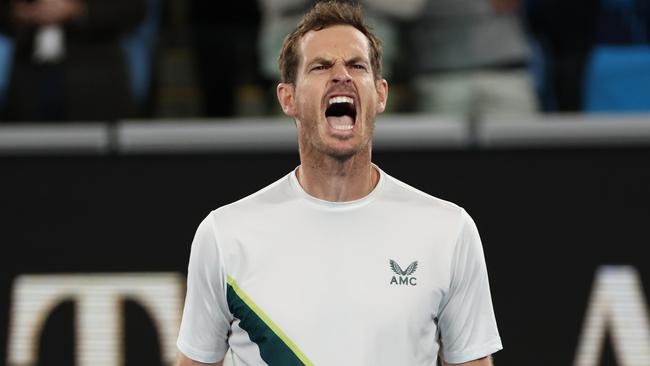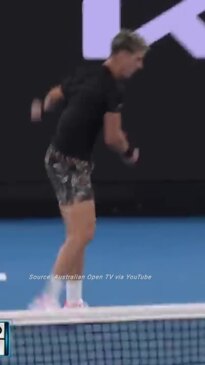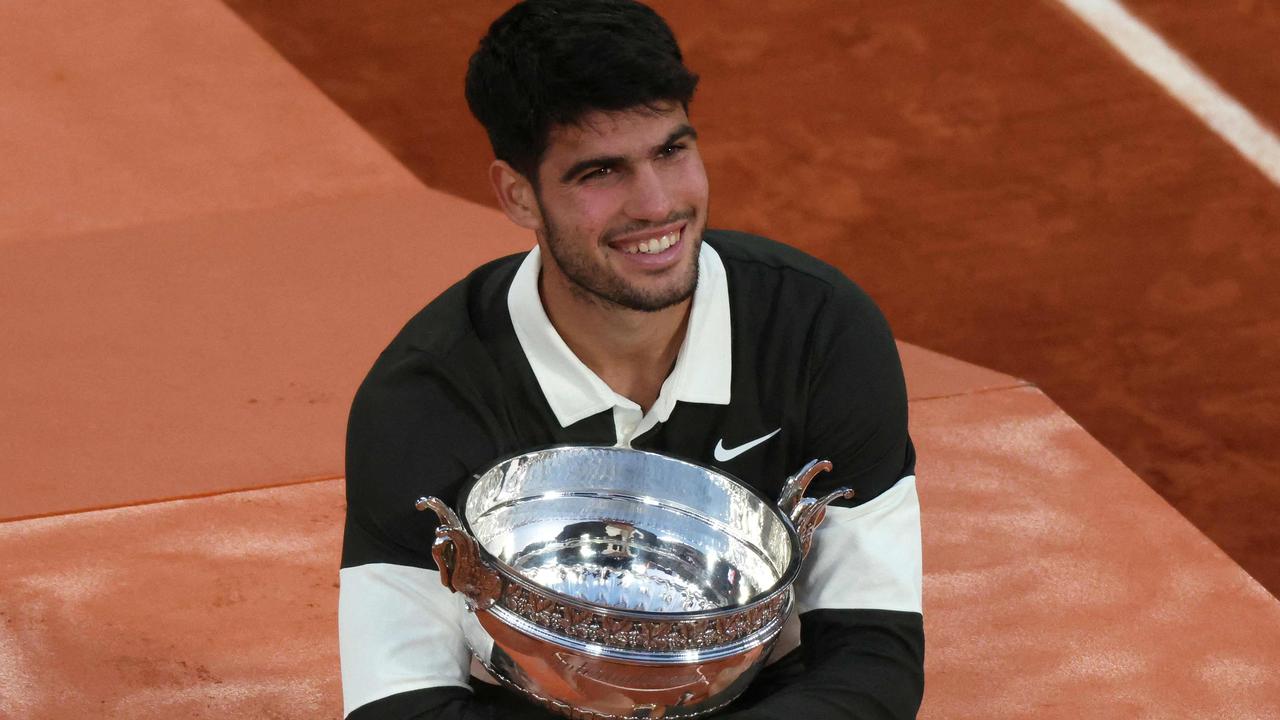Australian Open: Andy Murray blasts Open ‘joke’ after win over Kokkinakis
Andy Murray got up not long before the sun came up. His five-set, four-hour win over Thanasi Kokkinakis was a classic.

At 3.45am, you could hear one voice. A Scottish one. C’mon, it said. Let’s go. Andy Murray was goading himself. And Thanasi Kokkinakis. Staring at him, daring him. Saying it again. Come on, young fella. Let’s go.
What a night. What a knight. What a tournament this Australian Open has become. Superstar-deprived but large-hearted. Epic matches and electrifying atmospheres. If TV viewers are down, they’re missing out. C’mon, young fella. Let’s go.
Extraordinary scenes inside Margaret Court Arena as Murray beat Kokkinakis 4-6 6-7 (4-7) 7-6 (7-5) 6-3 7-5. They struck the first ball at 10.20pm. Finished at 4.05am. “I have a big heart,” Murray said as the devastated and exhausted Kokkinakis fought back tears, walked off with a smashed racquet and wrote on social media: “This f..king sport, man.”
“The match was obviously very up and down,” Murray said. “There was frustration in there. There was tension. There was excitement, all of that stuff. Then at the end – look, it‘s obviously amazing to win the match but I also want to go to bed now. It’s great, great. But I want to sleep.”
At 5hr 45min, it was the longest match of Murray’s career. Second only to the 5hr 53min final between Novak Djokovic and Rafael Nadal as the Open’s longest match.
The latest finish since Lleyton Hewitt and Marcos Baghdatis clocked off at 4.34am in 2008.
Kokkinakis hit 37 aces and 102 winners and led 5-2 in the third set before Murray’s iron-willed revival.
“By far the longest match that I’ve played,” Murray said.
“The conditions, that‘s what’s going to happen.
“You play in cold conditions, at that time of the day, with balls like that, you’re going to get long rallies and long points. Finishing at four isn’t ideal.”

Nor was his inability to take a toilet break because he had already used his two allotments. At one stage of the match he shouted, “Why are we playing at 3am?”
He grumbled to his entourage: “It’s a joke. It‘s so disrespectful that the tournament has us out here until 3am and we can’t even go for a piss.”
Afterwards, he said: “Look, I understand the rules on the tour with the toilet breaks and the bathroom breaks. I‘ve obviously been very vocal about that. But it’s three in the morning. I’ve been drinking all day. Need to go to the toilet. It’s frustrating in that moment.
“I understand you don’t want people taking advantage of the rules but when you’re sticking on the players at three, four in the morning, sometimes there needs to be a little bit of leeway.”
Murray has played a total of 10 hours and 34 minutes in back-to-back five-setters against Matteo Berrettini and Kokkinakis. He has to back up against Spanish ironman Roberto Bautista Agut.
How remarkable is the Murray recovery? Five years ago, when he lost to Bautista Agut in another five-setter in Melbourne, a retirement video was played. Unable to get to sleep on Friday before the sun came up, he was unsure if the relatively quick turnaround would constitute a health risk.

“Potentially,” he said. “It‘s strange because the courts are fast. The courts are not slow. But the balls, I mean, when we started tonight, like, at the beginning of the match, it felt like there was no, I don’t know, pressure in the ball. Flat, almost.
“That was what I was complaining about quite a lot during the match. It’s just difficult to hit winners once you’re in the rallies. You’ve seen it. I think there was a 70-shot rally yesterday. Multiple 35, 45-shot rallies, which is not normal. Probably need to look at that.”
About 2000 spectators were inside the 7500-seat arena for the final throes. Murray claimed such a late finish served no purpose. Too late for most fans at the Open. Too late for most TV viewers. He wondered what the parents of the ballkids were thinking.
“I don‘t know who it’s beneficial for,” he said. “A match like that, we come here after the match and that’s what discussion is. Rather than it being, like, epic Murray-Kokkinakis match, it ends in a bit of a farce.
“Amazingly, people stayed until the end. I really appreciate people doing that, creating an atmosphere for us at the end. Some people need to work the following day and everything.
“If my child was a ball kid for a tournament, they’re coming home at five in the morning, as a parent, I’m snapping at that. It’s not beneficial for them.”

He said: “It’s been spoken about for years. When you start the night matches late and have conditions like that, these things are going to happen.
“It’s not beneficial for the umpires, the officials. I don’t think it’s amazing for the fans. And it’s not good for the players.”
Australian Open chief Craig Tiley said there were no plans to put a curfew on matches in the wake of the near-dawn finish. “At this point, there’s no need to alter the schedule,” he told The Today Show. “We will always look at it, when we do the (tournament) debrief – like we do every year.
“But at this point, at what it is, we’ve got to fit those matches in the 14 days, so you don’t have many options.”
Tennis great Martina Navratilova said change was “essential”.
“It is essential we create better rules in tennis regarding the weather (light and wind) and starting times or cut-off times for matches,” the 18-time singles grand slam champion said. “Murray and Kokkinakis will finish around 4am. Crazy — no other sport does this.”
Tiley said Melbourne’s week of wild weather had compounded the issue. “It’s extremely difficult. There’s so many variables that go into thinking about how you’re going to make it work each day,” he said.
“Over the last three days, we’ve had extreme heat, over five breaks of rain, we’ve had cold, and it’s Melbourne … we’ve had three late nights with scheduling to try and catch up with matches.
“(We budget expected times for matches but) you are going to have an out of the box situation, like last night, where it goes extra-long, unexpectedly.
“There’s always one, and it’s always hard to schedule the entire event around the possibility that it’s going to happen one time.
“You’ve also got to protect the matches. If you just put one match at night and there was an injury, you don’t have anything for the fans or the broadcasters.”
He said there is “absolutely” a welfare element for players, many of whom he said opted into extra events like doubles that also affected their schedule.
Additional reporting: Lauren Wood




To join the conversation, please log in. Don't have an account? Register
Join the conversation, you are commenting as Logout